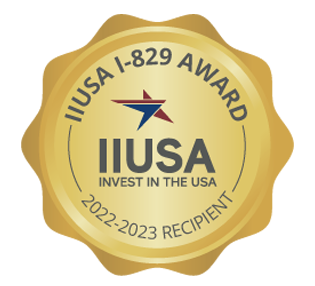E2 treaty visa is a non-immigrant visa available to Foreign nationals from eligible countries. Eligible countries are those that have an E-2 treaty with the United States (US), have an agreement with the US, or have been selected by legislation. Residents from countries like China, Russia, Brazil, and India may not apply for E2 visa. An EB-5 Visa is an immigrant visa not restricted to treaty countries and leads to U.S. Permanent Residence or a Green Card subject to meeting certain requirements.
E-2 visa does not grant a permanent status in the United States. Depending on the Nationality of the treaty investors they can be granted a visa from 1 year to 5 years. Extensions are given indefinitely if the E-2 Treaty Investors continues to meet the requirements. United States Citizenship and Immigration Services or USCIS may deny the renewal application if they find that the business doesn’t continue to meet the requirements of E-2 visa. USCIS discretion in renewal brings a level of uncertainty to the whole process and may lead to difficulties in travel overseas or planning life in general in the United States. Further, children of E-2 Visa holders age out at 21 years, that is they need to apply for their own visa or leave the United States.
EB-5 Visa grants U.S. Permanent Residence or Green Card to the Investor and their qualifying dependents that include spouse and children below the age of 21. Permanent Residence or Green Card allows all the family members to live, work, study in the United States, also, after 5 years subject to meeting certain conditions the investing family can apply for U.S. Citizenship. Once the investor family receive their green cards, they do not have to worry about aging out of their children at 21. Also, green card holders are not subject to frequent renewals. They must renew their green card every 10 years by proving that they have not abandoned their U.S. residence. Read more about EB-5 visa eligibility criteria’ with the link to https://www.3gfund.com/eb-5-visa-requirements/
E-2 visa gives the visa applicant the right to live and work in the United States. Spouse of E-2 Visa holder can also work subject to applying for an Employment Authorization Document. However, the main applicant is restricted to working for the qualifying E-2 business. Further, to maintain their status in the United States, the E-2 business needs to remain functional and the investment in the business should be more than the minimum sustenance level. This means whether the business is successful or not, E-2 visa holder needs to maintain it to remain in the United States, this may lead to financial hardships. Closure of E-2 business because of catastrophic events like recession or pandemic may result in the investors and their family leaving the United States.
An EB-5 visa allows foreign nationals to obtain permanent residence. To be eligible for permanent residence, individuals must invest a minimum of $800,000 into a Targeted Employment Area (TEA) or $1,050,000 through a United States Citizenship and Immigration Services approved regional center or by starting their own business. This investment must lead to the creation of 10 US jobs. Most EB-5 Visa applications are filed through USCIS approved Regional Centers as it enables investors to invest in a large project along with other EB-5 investors which usually results in excess job creation thereby making it easier to secure immigration benefits. Once the EB-5 investors have proved that their investment has resulted in the creation of 10 jobs, they can withdraw their investment upon meeting sustenance requirements. Also, EB-5 investors and their families are not restricted in profession or geography based on their investment. They can live and work anywhere and for anyone in the United States.
Ultimately, an EB-5 visa is more beneficial to those who wish to live and work in the US permanently. EB-5 visa leads directly to a green card and a legal permanent residence. It is open to all countries and has recently been updated to make the process safer and quicker for applicants. Investors may pass their status to loved ones, who may also live and work in the US.
For more information on GGG and EB-5, please follow us on YouTube, Twitter, Facebook, LinkedIn and Instagram.


